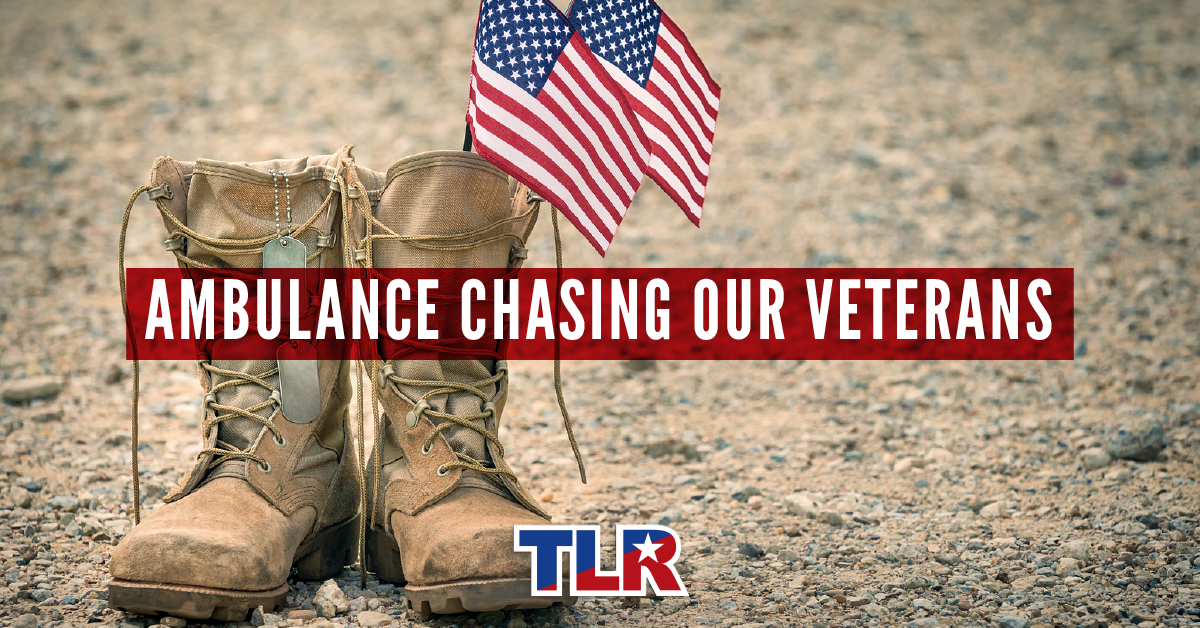
Ambulance Chasing Our Veterans
Barratry—more commonly known as ambulance chasing—is one of the biggest challenges currently facing Texas’ legal system. Barratry has been illegal in the Lone Star State for decades. But that small technicality hasn’t stopped the practice from flourishing.
Whether lawyers are trolling emergency rooms for car accident clients, working superstore parking lots to recruit plaintiffs to sue for undiagnosed diseases from alleged asbestos exposure or going door-to-door in neighborhoods soliciting property owners to sue insurance companies for storm-caused property damage, ambulance chasing is a serious problem.
A recent poll showed that most Texans recognize the severity of the consequences of ambulance chasing. Sixty-seven percent of respondents agreed that personal injury trial lawyers exploit people injured in accidents and with illnesses for their own gain.
Where will we draw the line? What will it take to finally hold ambulance chasers accountable for breaking the law and taking advantage of our sick and injured neighbors?
The answer may be when they start messing with Texas veterans.
Many veterans serving in Iraq and Afghanistan were exposed to smoke from pits where garbage was burned. These burn pits were used to dispose of everything from food and medical waste to batteries and chemicals. Some veterans who have returned from service in Iraq and Afghanistan have linked their exposure to burn pit smoke to serious illnesses they have developed.
The Department of Veterans Affairs has set up a registry for veterans who believe they were affected by exposure to burn pit fumes, and the issue is the subject of Congressional hearings and proposed federal legislation. These efforts to analyze the problem are critical and must continue in order to determine the health effects of open burn pits and the healthcare options for veterans who suffer from exposure to the burn pits.
Unfortunately, personal injury trial lawyers have also become involved, with some law firms advertising for veteran clients to join class action lawsuits against military contractors.
Efforts to establish a state-based burn pit registry during the last legislative session failed in Texas. While the bill’s goal—to create a state resource for veterans to share information about their exposure to burn pits and subsequent illnesses—seems worthy on its face, TLR expressed concerns that the registry could become a recruiting tool for unscrupulous personal injury trial lawyers looking to make a buck off unsuspecting veterans. At a cost to the state of $3 million a year, taxpayers would be footing the bill to create a duplicate registry that would aid in the solicitation of clients by mass tort lawyers.
We all owe a debt of gratitude to the men and women of our armed forces. Texas can and should do all it can to ensure our service members receive all of the resources they need when they return home. We should also protect those service members from becoming the next target of ambulance chasing personal injury trial lawyers.
TLR has been in contact with the bill’s authors since the end of last session about our concern that a registry could be used for solicitation of veterans by plaintiffs’ lawyers. If the Legislature decides to move forward with a state registry, TLR has pledged to provide our resources in crafting a bill that allows a state registry to be used for official communications with veterans by state agencies and employees, while preventing solicitation by unscrupulous personal injury trial lawyers looking to take advantage of our veterans.
